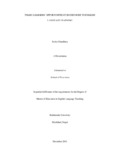
Please use this identifier to cite or link to this item:
https://hdl.handle.net/20.500.14301/216| Title: | THARU LEARNERS’ OPPORTUNITIES FOR EXPOSURE TO ENGLISH LANGUAGE LEARNING |
| Authors: | Chaudhary, Sarita |
| Citation: | Chaudhary, S.(2012).“Tharu Learners’ Opportunities for Exposure to English Language Learning” |
| Issue Date: | Dec-2012 |
| School: | SOED |
| Department: | DOLE |
| Level: | Masters |
| Program: | Master of Education in ELT (2 years) |
| Abstract: | This study fundamentally deals with the exposure of Tharu learners encompassing their initiatives and undertakings in their local settings. The Tharu learners’ exposure opportunities enhancement and standard of quality education move simultaneously. Lack of exposure among the Tharu learners prevents them from learning to speak English. Thus, the Tharu learners need appropriate opportunities of exposure to broaden their repertoire of skill which make them able to speak overcoming interferences of their mother tongue. The Tharu learners in the Nepalese society are considered as underprivileged ethnic group, they need to be equipped with latest exposures to face the challenges in the context of speaking. The research was carried out to explore the exposures of the Tharu learners in their improving speaking skill. Although Tharu learners’ speaking improvement have problems in many different areas, it seems that certain linguistic problem emerge even when they think about the enhancement of exposure is appropriate ways of learning to speak English. This study revealed some of the important exposure opportunities which help the Tharu learners to improve their speaking in the rural setting. The Tharu learners improve their speaking in rural setting of Nepal where no prominent opportunities are available for Tharu learners’ speaking enhancement. To proceed with this study, I followed qualitative approach with focus on its philosophical concerns embracing my ontological, epistemological assumptions. The ontological assumptions for this study subscribe multiple realities. The epistemological assumption is subjectivist because knowledge is created through interactions with research participants. The axiological stance is value-laden since all participants’ ideas deserve worth. I collected understanding and experiences of research participants through narrative and interviews and by observing them in their own world. I adopted the interpretive paradigm and ethnographic approach. Through these approach and paradigm I interpreted the lived experiences relying on the participants understanding, Tharu learners’ learning speaking exposures’ enhancement. The findings indicate that Tharu learners have traditional hangover in their learning. The issue of Tharu exposures enhancement is inclusively realized by the Tharus themselves. The exposure such as adopting English books, television, involving in different debates is not common exposure for them. Very few of them are partially using them to enhance their speaking skill |
| URI: | https://hdl.handle.net/20.500.14301/216 |
| Appears in Collections: | Dissertation |
Files in This Item:
| File | Description | Size | Format | |
|---|---|---|---|---|
| Sarita final print.pdf | 1.06 MB | Adobe PDF |  View/Open |
Items in DSpace are protected by copyright, with all rights reserved, unless otherwise indicated.